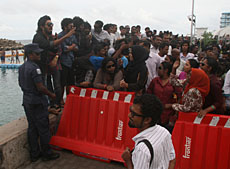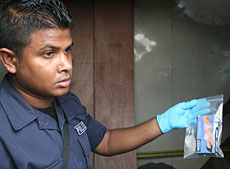Additional reporting by Daniel Bosley
Police raided the opposition Maldivian Democratic Party (MDP) protest camp at Usfasgandu this morning, after obtaining a search warrant from the Criminal Court and cordoning off the area from MDP demonstrators.
MDP MP Mariya Ahmed Didi was inside the cordon showing the warrant to a group of media representatives shortly after 8:00am, as dozens of police began to gather in the area.
Reasons for the search as stated on the warrant included: “suspected criminal activity”, “damage to public property”, and “suspected black magic performed in the area”.
Under evidence, the warrant alleged that people in the Usfasgandu area verbally abused police officers and damaged a police vehicle on April 20, obstructed a Maldives National Defence Force (MNDF) exercise of May 9, and on May 25 “MDP protesters threw a cursed rooster at MNDF officers.”
As blue-gloved officers from the Drug Enforcement Department (DED) arrived, a group of largely female protesters began to gather at the barricades set up near the STELCO building. The barricade was itself lightly manned by police, however a group of police stationed further back near the Dharubaaruge convention centre were equipped with riot shields, gas masks and rubber bullet guns.
The crowd was noisy and upset, but non-violent. An altercation erupted at the front between a group of women and several young men, whom protesters claimed had been sent by a government-affiliated party to provoke the crowd. Minivan News later observed one of these men being arrested by police after trying to break through the barricade.
Meanwhile, DED officers fanned out at the Usfasgandu site and began poking through plants and debris around the padlocked container under the main stage. A large group of police on the other side were picking through rocks along the seawall, while a police boat waited outside the harbour.
Media raced over to photograph the first discovery, retrieved from a nearby bush: cigarette butts and a brown substance wrapped in an MDP membership form. Police near the stage had meanwhile lifted up a wooden board and found a small plastic baggie containing the remnants of a dried substance.
A major find occurred after police broke open the container, searching through old paint tins and debris before reaching into a ceiling cavity, triumphantly producing a packet of condoms (‘Moods’ ultrathin).
The Usfasgandu area had been given to the MDP by the (MDP-dominated) Male’ City Council, after it was evicted by police from its previous camp just metres down the road at the tsunami monument. Police at the time claimed the area was being used as a hub for criminal activity and assorted deviancy, and a similar raid uncovered beer and condoms. The camp was immediately dismantled by the police and MNDF, and walls were painted over grey to remove all trace of the MDP from the area.
The Usfasgandu raid this morning ends a stalemate between the Home Ministry – headed by former Justice Minister during Maumoon Abdul Gayoom’s rule, Dr Mohamed Jameel – and Male’ City Council.
The Housing Ministry initially sought to repossess the area from the Council, which refused to cooperate. The Home Ministry then instructed police to retake the area, who approached the Criminal Court for a warrant. The court initially denied this warrant, stating that the repossession was a civil matter and not within its jurisdiction.
Eight days later and Home Minister Jameel yesterday announced that the Ministry had received complaints of criminal activity in the area: “No complaints of any criminal activities had been raised with us at the time [of the original court order request]. But now many complaints have been received including criminal offences,” he told local media.
Police Spokesperson Sub-inspector Hassan Haneef said that following a search of the area a decision would be taken on whether to shut down the site.
“If there is reasonable evidence of crimes being committed there, we would look to close the area,” he said.
Male City Mayor Ali ‘Maizaan’ Manik was standing next to a cage full of crows – kept on the site by the MDP demonstrators to mock President Mohamed Waheed, who is caricatured as a crow on the popular Maakanaa Show.
“I’m too angry to talk right now,” he told Minivan News, as police were left to pick through the area after media scurried to protect their cameras from the sudden downpour.
Back through the police barricades, one visibly upset protester expressed frustration at what he described as “a police state”.
“We just want somewhere to peacefully protest,” he said. “They are just going to plant something, like drugs or explosives, so they can blame us. What can we do? We are helpless.”
An older man came up, put his hand on his shoulder, and led him out of the rain.


